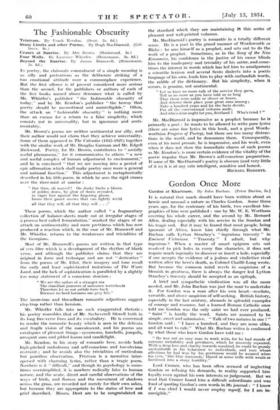The Fashionable Obscurity
Tristram. By Frank Kendon. (Dent. 2s. 6d.) Stony Limits and other Poems. By Hugh MacDiarroid. (Gol- lancz. 6s.)
In poetry, the elaborate concealment of a simple meaning is as silly and pretentious as the deliberate striking of a too emotional attitude over a commonplace experience. But the first offence is at present considered more serious than the second, for the publishers or authors of each of the five books named above denounce what is called by Mr. Whistler's publisher " the fashionable obscurity of today," and by Mr. Hendon's publisher "the heresy that poetry should be unemotional and unintelligible." Often, the attack on " fashionable. obscurity " is nothing more than an excuse for a return to a false simplicity, which consists pot in universality, but in ignorance and senti- mentality.
Mr. Brown's poems are neither sentimental nor silly, and their author would not claim that they achieve universality. Some of them appeared in The Calendar (1925-1927) together with the similar work of Mr. Douglas Garman and Mr. Bdgell. Rickword. Poetry, for Mr. Brown, contributes to " socially useful phenomena," for it communicates to others " a new and useful complex of human adjustment to environment," and he is convinced " that we are movu►g into a period of epic affirmation which shall make poetry once more a general and national function." This adjustment is metaphorically described in his title-poem, in which he sees the rigid cranes over the river-mist at sunrise :
" But then, oh marvel ! On dusky limbs a bloom of golden down, by glow of dawn revealed, in eager line against the lingering gloom limns their gaunt sinews that can lightly wield all that they will, all that they will . . ."
These poems, which the author called " a fragmentary collection of balance-sheets made out at irregular stages of a process best called fermentation," marked the stages of an attack on sentimentality and mere prettiness which has now produced a reaction which, in the case of Mr. Bramwell and Mr. Whistler, returns to the weaknesses and trivialities of the Georgians.
Most of Mr. Bramwell's poems are written in that type of vers litre which is a development of the rhythm of blank Verse, and although the publisher claims that they are 4riginal in form and technique and are not " derivative " from the poems of Mr. Eliot, their imagery and tone recall the early and least sophisticated imitations of The Waste Land, and the lack of sophistication is paralleled by a slightly too noisy statement of a conscious stoicism :
" We are the sailors of a stranger sea The standfast pioneers of unknown waterlands Therefore let us not awhile turn back Because no land horizons our grey life."
The inversions and threadbare romantic adjectives suggest clap-trap rather than heroism.
Mr. Whistler falls into no such exaggerated. rhetoric : his poetry resembles that of Mr. Sacheverell Sitwell both in its long free-verse lines and its vocabulary. He is concerned to render the romantic beauty which is seen in the delicate and fragile vision of the convalescent, and his poems are catalogues of pleasant things—sycamores, harebells, jonquils, arrogant suns and gilded leaves and candlelight.
Mr. Hendon, in his story of romantic love, avoids both high-pitched melodrama and self-conscious and too-obvious restraint ; and he avoids also the trivialities of meticulous but pointless observation. Tristram is a narrative inter- spersed with charming lyrics, rather than a tragic poem. Nowhere is it " difficult," and though its psychology is some- times oversimplified, it is nowhere radically false to human nature, and the acute, direct and careful observations of the ways of birds, and flowers and the movement of shadows across the grass, are recorded not merely for their own sakes, but because they are appropriate to the states of love and grief described. Messrs. Dent are to be congratulated on
the standard which they are maintaining in this series of pleasant and well-printed volumes.
Mr. MaeDiarmid's poetry is romantic in a totally different sense. He is a poet in the grand manner of Wordsworth or Blake : he sees himself as a prophet, and sets out to do the work of a prophet. Sometimes, as in the Song of the New Economics, his confidence in the justice of his cause blinds him to the inadequacy and triviality of his satire, and some- times the interest in words which has led him to amalgamate a scientific lexicon and several Scots dialects into a poetic language of his own, leads him to play with outlandish words, the rabble of the dictionary. But his simplicity, when it occurs, is genuine, not sentimental.
" Let us have no more talk of the service they gave, Tell us no more as you have told us so long That these were noble or clever or brave, And deserve their place your great sons among ; Take a hundred years and let the facts decide. Put all the conventional tributes aside, And who's done aught for you, Scotland ? Who's tried ? "
Mr. MacDiarmid is impressive as a prophet because he is primarily a poet : he wants to be allowed to write pure lyrics' (there are some fine lyrics in this book, and a good Words- worthian Progress of Poetry), but there are too many distrac- tions in the world, and he denounces them. Consequently, even at his most prosaic, he is impressive, and his work, even; when it does not show the immediate charm of such poems as Mr. Hendon's, is more certain evidence of the vitality of the: poetic impulse than Mr. Brown's self-conscious preparation. If some of Mr. MacDiarmid's poetry is obscure (and very little• of it is) it is at any rate intelligent, sensitive and honest.
MICHAEL ROBERTS.






































 Previous page
Previous page